PHP frameworks are like onions — not because they make you cry, but because they have layers.

Jokes aside, PHP frameworks do have layers, and if you don’t have much knowledge of them, the subject may lead to tears. In this post, we will discuss the details of PHP framework technologies and eliminate some of the ambiguity surrounding them.
We will also discuss why they are helpful for your team’s workflow and why you should incorporate them into your team projects. Additionally, you’ll learn about their pros and cons and some of the most popular PHP frameworks in the industry.
Table of Contents
- What is a PHP framework?
- Why use a PHP framework?
- 11 Best PHP Frameworks
- Choosing the Best PHP Framework
What is a PHP framework?
A PHP framework is built on the open-source language PHP and offers built-in features to improve your software development lifecycle. These features increase development speed and improve performance within your team by lowering the workload of your developers.
PHP has been around for many years, and as a result, it is extremely robust.
PHP is a cornerstone in the development community for everything from computer programming to software and web development. Developers use PHP to create desktop applications, games, command-line scripting, automation services, and more.
Despite being around for so long, current market trends show that PHP is here to stay. The coding language is still used for nearly 80% of all websites in 2023.
Given the wide variety of its use, the programming language has a decent learning curve — enter PHP frameworks. These frameworks ease the learning curve by providing pre-built software, rules, and platforms to build your software.
Why use a PHP framework?
PHP frameworks can improve your development pipeline. These improvements cover everything from security to productivity within your organization. Each framework has different focuses — some may focus on development workflow and others on scalability.
One perk that all of these frameworks offer is excellent security, which is vital for software development. Maintaining security from the beginning of your development pipeline is akin to a DevSecOps approach that leads to improved performance.
The Drawbacks of Using a PHP Framework
There are a few drawbacks to using a PHP framework for your software development teams.
The first is an increase in programming restrictions. You can do far more with PHP if you don’t use a framework. A framework will reduce programming complexity. This works well if you’re looking for efficiency. However, manual coding gives your more flexibility in what you can accomplish.
Additionally, each framework has a learning curve. You won’t immediately know how to interact and use that specific framework. This learning curve is not nearly as difficult as learning an entirely new programming language, but you’ll still need time to get up to speed.
11 Best PHP Frameworks
Let’s discuss some of the best PHP frameworks and their overall difficulty. When compiling this list, we considered aspects like onboarding, learning the language and syntax, and complexity. Frameworks are described as easy, moderate, and difficult.
1.Fat-Free Framework
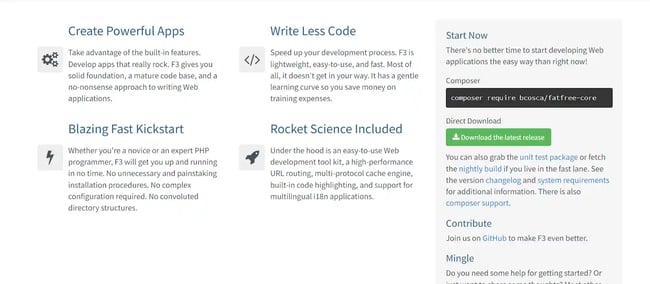
The Fat-Free Framework thrives in simplicity. The framework shoots for minimalism in structural components, avoids application complexity, and balances code elegance, application performance, and programmer productivity.
Fat-Free Framework, or “F3,” is a great place to start when learning how to implement a PHP framework in your team workflow. This micro-framework also supports using multiple database languages for variety and flexibility.
What we like: F3 is extremely lightweight. The file size is less than 100KB. This also means you can get it up and running quickly if you’re looking for an immediate solution.
- Difficulty: Easy
- Limitations: F3 requires more module setup
2.Slim
Slim is a PHP micro-framework that helps you quickly write simple yet powerful web applications and APIs. Slim is a micro-framework for receiving and returning HTTP calls, stripped down to its most essential features to support simplistic use.
Slim is a fast framework because it lacks third-party dependencies and is best for developing small apps and APIs. This framework is easy to set up, having you “hello World” ready in just a few minutes. Slim is considered one of the best PHP frameworks around.
Best for: Creating rest APIs while remaining a micro-framework. It’s an ideal tool for creating APIs that consume, repurpose, or publish data.
- Difficulty: Easy
- Limitations: Not optimized for large applications
3.PHPixie
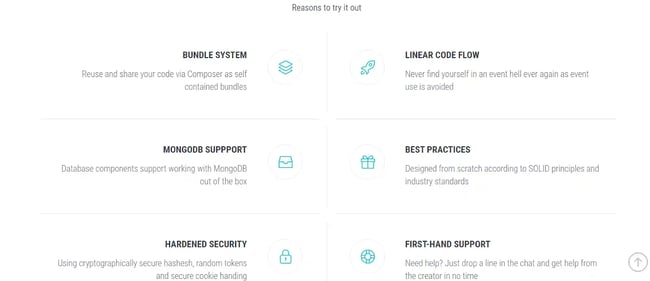
PHPixie started as a micro-framework and has gradually become one of the most popular full-stack PHP frameworks while retaining its high performance. PHPixie uses the HMVC design pattern and as such is fast and reliable.
Remember, this framework is relatively new, includes fewer modules, and has less community support. PHPixie is easy to get started and easy to use. However, if you encounter problems, you may find yourself at a roadblock with little help.
What we like: PHPixie’s strict architecture allows stability while avoiding common pitfalls. The code is easy to read, debug, extend, and test.
- Difficulty: Easy
- Limitations: Less support and not quite as robust as other options on this list
4.CodeIgniter
CodeIgniter is a robust PHP framework with a very small footprint, built for developers who need a simple, elegant toolkit to create full-featured web applications.
This framework is made for fast startup and minimal asset overhead. This reduced footprint allows for fast setup and better project runtime speeds.
CodeIgniter is probably one of the most comprehensive frameworks on this list. It provides only the basics but is extremely extendable, allowing you to do almost anything you need. This framework also offers security features and promotes the MVC architecture.
Best for: Building large-scale web applications within a simple framework. CodeIgniter provides guides and reference documents for ease of use.
- Difficulty: Easy
- Limitations: Not the best choice for security
5.Laravel
Laravel is a web application framework with expressive, elegant syntax. Laravel is one of the world’s most popular open-source frameworks and is B2B ready. It was created to offer a framework that provides features that CodeIgniter doesn’t, such as user authentication.
Laravel includes security features to protect against SQL injection and Cross-Site Forgery Requests (CSFR). You’ll also have access to workflow tools, such as asset compilers, and a command-line interface (CLI).
This framework focuses on improving workflow efficiency, making it a valuable tool for your team, but the added features make it a little harder to learn.
What we like: Laravel is the most popular PHP framework at the time of writing this post. Developers have many good things to say about the experience it provides — both speed and enjoyment!
- Difficulty: Moderate
- Limitations: A bit more complex to use, better for large projects
6.Laminas
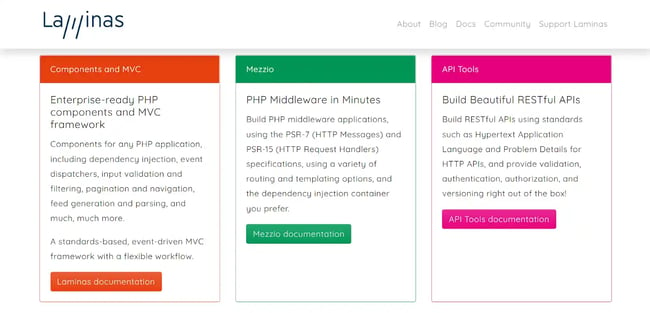
Laminas, previously known as “Zend Framework,” is a collection of professional PHP packages with more than 570 million installations. This framework has been around for a very long time and has a massive community of developers that support this framework.
Due to its long life, Laminas has many features that have been added and incorporated. This steepens the learning curve. On the other hand, this framework has been around so long it is constantly being updated with optimization and efficiency changes.
What we like: Laminas has many components with minimal dependencies, allowing you to pick and choose the way you want to use it.
- Difficulty: Moderate
- Limitations: Exceedingly steep learning curve for mobile developers
7.CakePHP
CakePHP is designed to make common web development tasks simple and easy. CakePHP 4 is a web development framework running on PHP 8.1. CakePHP is built for simplicity and has a large and growing number of features.
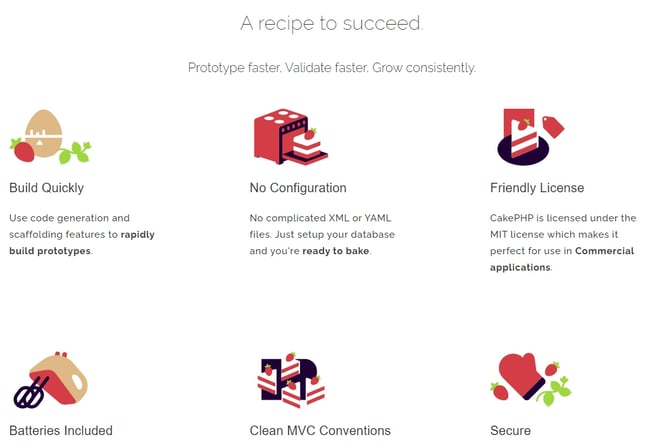
Installation is simple and only requires a running web server and a copy of the framework installed to get started. With its extensibility, CakePHP can meet the needs of almost any project. That includes security, user authentication, and fast builds.
Best for: Useful for implementing codes with different modules. If this describes your process, consider using CakePHP.
- Difficulty: Moderate
- Limitations: Can be a little complex to navigate due to its many features
8.Yii

Yii is a high-performance, component-based PHP framework for rapidly developing modern web applications. The name Yii (pronounced Yee or [ji:]) means "simple and evolutionary" in Chinese. It can also be thought of as an acronym for “Yes It Is!”
Because Yii is component-based and designed to be suitable for any web application, including CMS, ecommerce, and even single-page apps (SPAs), it offers excellent support and is highly customizable. However, first-timers beware, there is a lot to learn with this framework.
What we like: Yii has excellent and detailed documentation. These resources help you navigate the framework and soften the steep learning curve.
- Difficulty: Moderate
- Limitations: Steep learning curve
9.Phalcon
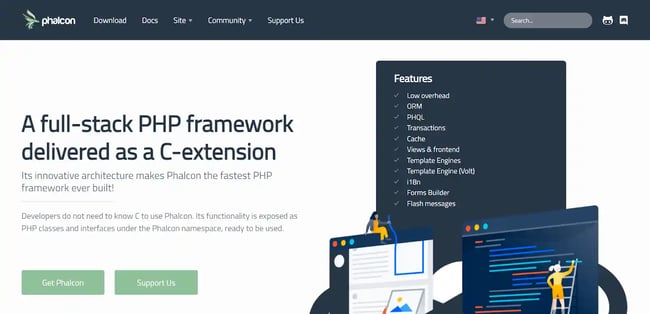
Phalcon is an open-source, full-stack framework for PHP, written as a C-extension. It's optimized for high performance, and its unique architecture allows the framework to always be memory resident. This means the framework can offer its functionality whenever needed, without the expensive file stats and file reads that traditional PHP frameworks employ.
There is no need to learn any C programming language to use Phalcon. The framework is easy to install and can handle any project up to an enterprise level.
Be aware, however, that the developers often need to catch up to make patch updates in response to submitted issues. This could leave your project at a halt or force the implementation of “hacky” fixes.
What we like: Phalcon has the fastest raw performance of all frameworks.
- Difficulty: Difficult
- Drawback: Developers often respond to bugs and issues slowly
10.FuelPHP
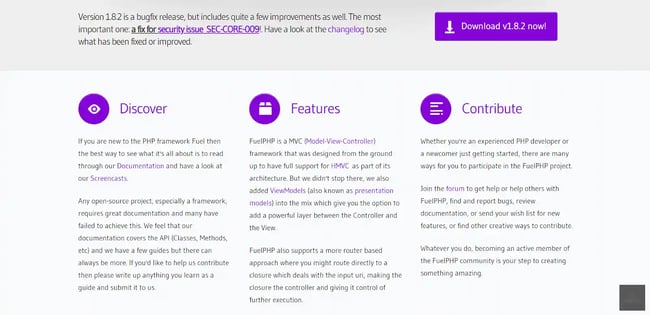
FuelPHP is a simple, flexible, community-driven PHP 5 web framework. It was born out of frustrations with the currently available frameworks and developed with support from a community of developers.
FuelPHP is extremely portable, works on almost any server, and prides itself on clean syntax. This framework is capable of building end-to-end web solutions, offering some of the highest security standards and methods.
This framework is relatively new and, as such, has less support infrastructure. You may be faced with a steeper learning curve.
What we like: FuelPHP protects against common vulnerabilities like cross-site scripting out of the box.
- Difficulty: Difficult
- Limitations: Less support and a steeper learning curve
11.Symfony
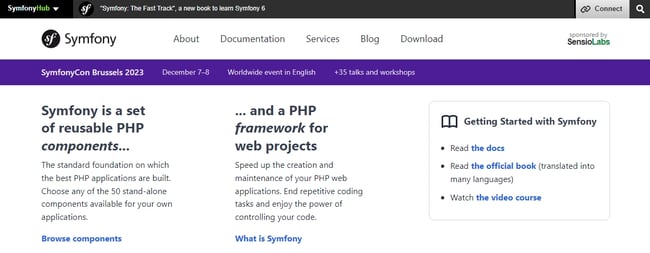
Symfony is a set of PHP components, a web application framework, a philosophy, and a community — all working harmoniously. This framework has been around for a long time and is reliable and mature. Symfony also follows PHP and web standards to the exact letter, relieving compliance concerns throughout development.
This framework is best suited for larger enterprise-level projects. It is very flexible and can integrate with larger projects such as Drupal. Symfony and Laravel have a lot of commonalities. However, Symfony is built with experienced developers in mind.
What we like: Symfony’s Database Support and Data Modeling options are robust and flexible.
- Difficulty: Difficult
- Limitations: Steep learning curve, slower than other frameworks
Choosing the Best PHP Framework
Choosing the best framework for your team can be stressful, but being properly informed will help. Besides using the metrics, let's wrap up by going through some tips on choosing the best framework to fit your needs.
1. Popularity and Community
Using a framework that has a large community often means you’ll struggle less when looking for answers to common questions. It also means that you will be more likely to find answers to less common questions.
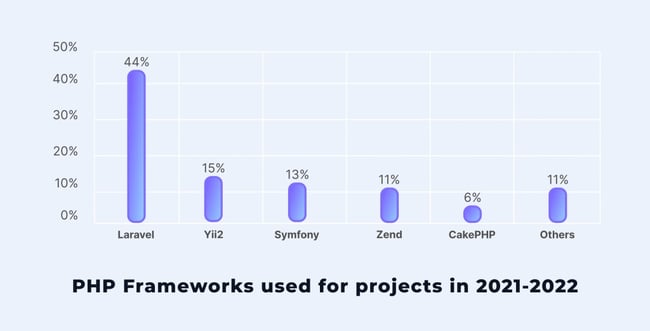
2. Culture
Finding a framework that matches the ideals and culture of your organization is a frequently overlooked concept. The importance of matching culture should not be underestimated, so if a framework does not meet your organization’s goals and ideals, look elsewhere.
3. Sustainability
Sustainability matters because it determines if the framework you are using will still be around later. Nothing is worse than rebuilding a project because a framework is no longer in production and thus contains outdated information or technology.
Sustainability matters when it comes to the scalability of your project. As your project grows, will the framework you are using continue to sustain it?
4. Software and Technology Support
Using a framework that offers greater flexibility is nice, but be sure to consider the level of support provided with it. Ensure the framework you choose offers software and technical support so your development process is not halted due to roadblocks you cannot surmount.
Getting Started with PHP Frameworks
PHP frameworks can help your team build applications efficiently and securely. You just need to find the right option for your team.
Consider your team’s development expertise and the scale of the projects in your pipeline. From there, draw up a wishlist. Then, you can find the right framework to support your organization.















